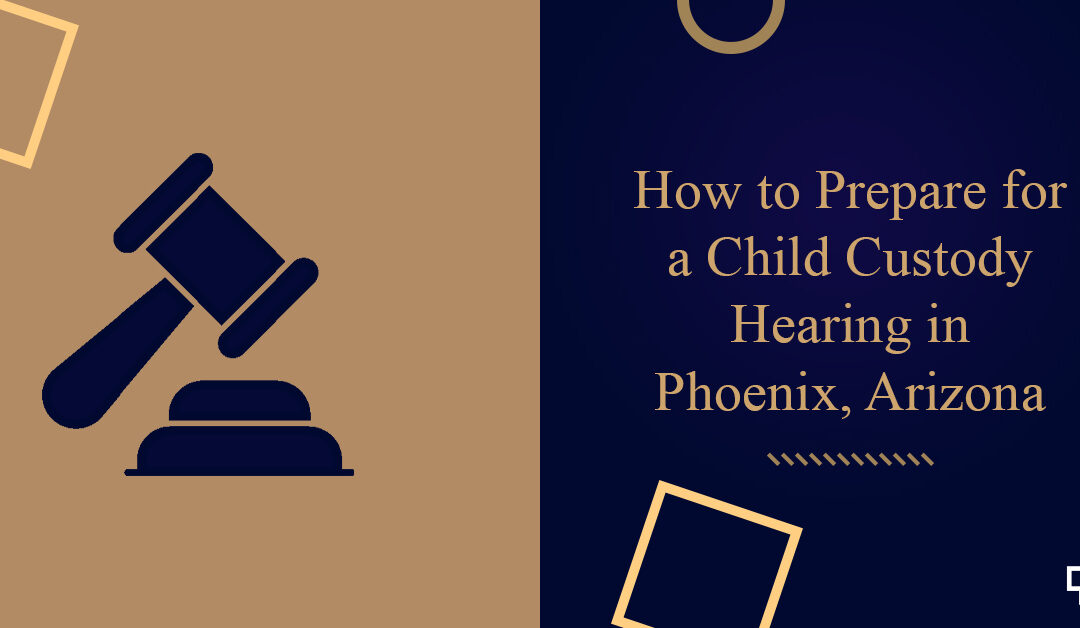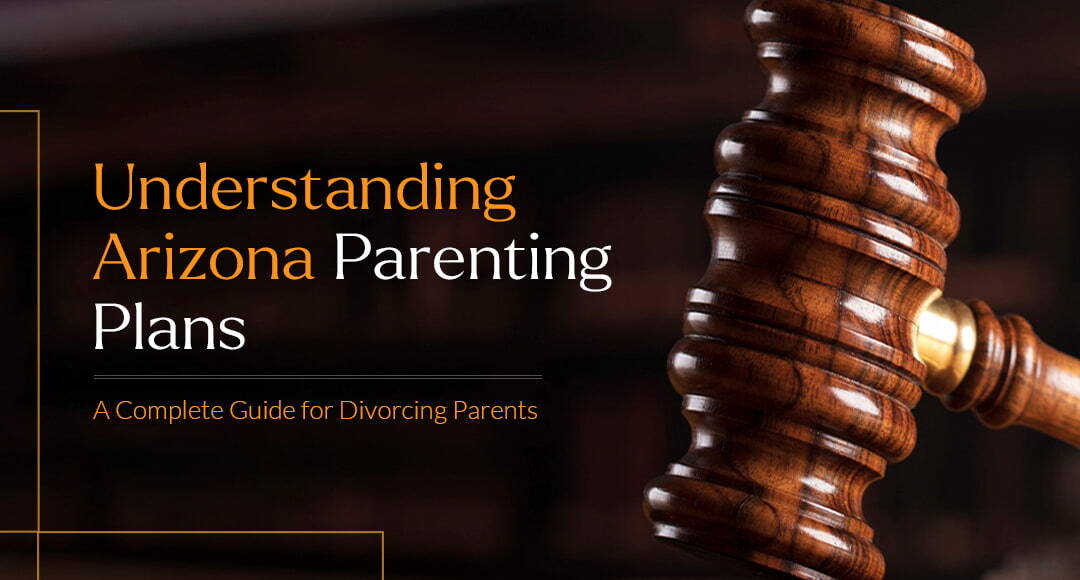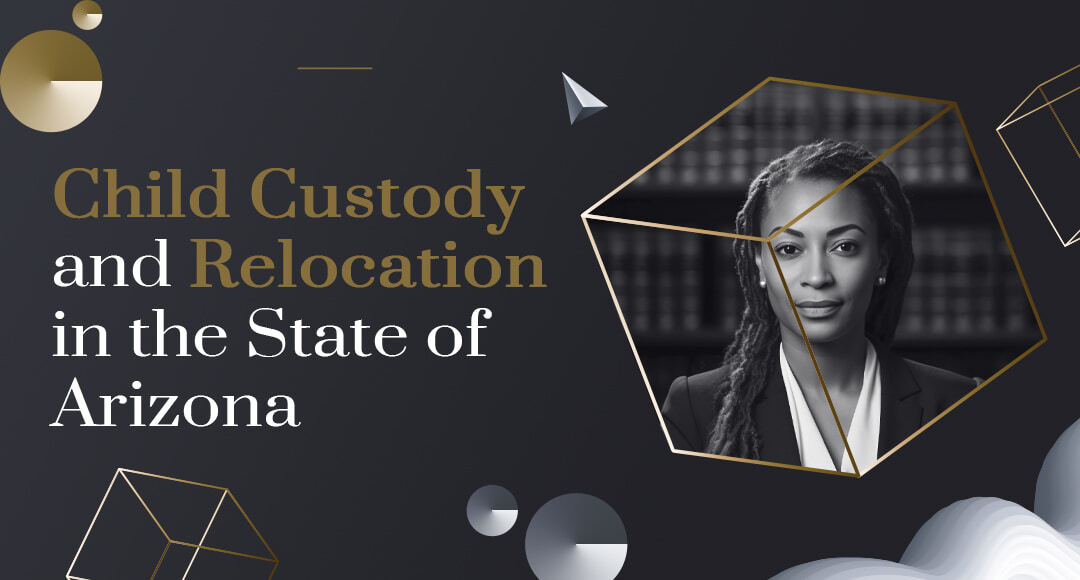
by John Schill | Aug 25, 2025 | Blog
Facing a court hearing for child custody is often a unique experience for every parent. While this is one of the major decisions for both the child and parents, it usually occurs during one of the worst times in a family’s life. Not only are you occupied with issues related to the divorce agreement, but you also need to consider the best interests of the child. In this article, we provide a brief guide on how to prepare for a child custody hearing in Phoenix, Arizona, and what to expect.
What to Expect in a Child Custody Hearing in Phoenix, AZ
Legal cases related to family law are handled under the Arizona family court system. They include cases such as divorce, child custody, alimony, and other domestic relations matters. In these cases, the court prioritizes the best interests of children and aims to resolve family disputes with reasonable solutions that can satisfy both parties. The procedure usually follows these steps:
- Trial preparation: Your child custody lawyer files all petitions in the correct jurisdiction
- Review: The lawyer goes over the process, evidence, and your testimony with you in preparation for the hearing date
- The trial date arrives.
- Attorneys present opening arguments: During the trial, both parties share their arguments, with the petitioner presenting first.
- Evidence and witness presentation: The testimony and evidence from both sides are submitted to the judge.
- Closing arguments: both sides summarize their arguments and reiterate their stance
- Final decision: After reviewing all the evidence and testimony, the judge presents a final decision on all points in the petition within 60 days
Although this process is clearly laid out, court cases often come with a few anticipated surprises. This is why you should prepare for the process with an experienced attorney to ensure you understand what to expect and have all your evidence and testimony ready.
How to Prepare for a Child Custody Hearing in AZ
As you prepare for your child custody hearing in AZ, make sure you are completely upfront with your lawyer so they understand your specific circumstances and do not face any unexpected revelations during the hearing.
It is normal to feel anxious and stressed about your child custody hearing. The attorney ensures that you understand what to expect and the proper way to respond to the proceedings. They will also help you prepare all the information needed before the hearing and show you how to best conduct yourself for the best outcome.
How to Prepare for a Custody Hearing Without a Lawyer
In addition to preparing your testimony and evidence with a child custody lawyer, you also need to make sure you are physically and emotionally ready for your hearing. It is best to observe another trial presided over by the same judge in your case to understand their thought process and help you feel more comfortable and prepared on your hearing date. It also helps to research rules and regulations for the family court in your jurisdiction to get a better understanding of what to expect.
On your hearing day, wear professional business attire as you would when attending a job interview. A dignified and conservative appearance is the expected norm in the courts. Choose neutral colors and solids, and avoid prints. Also, make sure you do the following on your hearing date:
- Arrive early: This helps you to easily find parking or log in early in the case of a virtual hearing.
- Always refer to the judge as “Your Honor.”
- Do not bring new romantic partners with you to family court
- Take your time and speak clearly when answering questions.
- Ask for clarification if you are confused about a question
- Don’t interrupt others and always show respect
- Be well-organized for your hearing.
Get an Experienced Child Custody Lawyer
Before your child custody hearing in Arizona, you need to be thoroughly prepared. Proper preparation ensures you understand what to expect. It also helps you to stay calm and present a confident image that can benefit your case. Get in touch with our experienced attorney at Schill Law Group to help you prepare and increase the chance of a favorable outcome of your child custody case.

by John Schill | Jul 25, 2025 | Blog
Arizona expungement laws have a unique history. It is the only method of addressing a record that does not erase or seal it from public view. Under the new law, effective from January 2023, individuals eligible for expungement can have their records sealed in Arizona. This article provides more details about expungement in Arizona, including who is eligible and how an attorney can help.
What Does Expungement Mean in Arizona?
Under Arizona law, expungement refers to the removal or erasure of an individual’s criminal record. It also refers to sealing or destroying a record for an eligible person. If you are eligible for an expungement order in Arizona, your records can be erased or removed from public view. As a result, the process removes the criminal record as if the crime never happened.
Record expungement in Arizona is not a pardon for committing a crime. It also does not remove the conviction, but expungement effectively erases a criminal record and makes it invisible to landlords, employers, the courts, and the general public. This gives the individual a chance to start over, without the worry of their criminal conviction getting in the way of jobs or housing.
Who is Eligible for Expungement?
In the recent past, Arizona has passed multiple laws that have expanded the eligibility criteria for expungement. Under ARS § 36-2862, which became effective on July 12, 2021, individuals with criminal offenses involving marijuana can petition the court for an expungement of their records. This includes arrests, convictions, and other marks on the individual’s record that relate to marijuana crimes:
- Possession, consumption, or transportation of 2.5 ounces or less of marijuana, in which less than 12.5 grams is marijuana concentrate.
- Possession, transportation, cultivation, or processing of no more than six marijuana plants at the individual’s residence for personal use.
- Possession, usage, or transportation of paraphernalia related to the cultivation, processing, manufacture, or consumption of marijuana.
ARS § 13-911 is the other new expungement law in Arizona passed on July 9, 2021. It states that a person can file a petition for expungement of his or her records after meeting certain conditions:
- Charged with a criminal offense, but the charge was then dismissed or resulted in a not-guilty verdict at trial
- Convicted of a crime and completed all terms and conditions of the court-imposed sentence.
- Arrested for a criminal offense, but no charges were ever filed.
Excluded Offenses to Clear Your Criminal Record
Arizona’s expungement laws play an important role in encouraging rehabilitation and creating new opportunities for individuals with criminal histories. However, not all offenses qualify for record sealing. Some of the offenses that may not be expunged include:
- Serious violent offenses
- Class 1 felonies
- Certain sexual offenses
- The offense of knowingly inflicting serious bodily injury on another person
- Offenses involving the use, discharge, or threatening exhibition of a deadly weapon or dangerous instrument
What’s the Waiting Period for Record Expungement After Filing a Petition?
If you want to file a petition for the expungement of your records, you will have to go through a state-imposed waiting period. This waiting period begins after you complete your sentence. However, in some cases, you may be able to petition the courts earlier. Depending on the severity of the offense, the waiting period can be:
- Lower-grade misdemeanors: 2 years
- Class 1 misdemeanor: 3 years
- Class 4, 5, or 6 felony: 5 years
- Class 2 or Class 3 felony: 10 years
What’s the Difference Between Dismissals and Expungements?
Expungements and dismissals are often confused, but a few key differences exist between the two. When a case is dismissed, the record will show that the charges were brought agaiants you, but were dropped without a conviction. If you were arrested, a record of that arrest is still visible and available to the public.
Felony expungement Arizona, on the other hand, involves destroying all records of your arrest and any subsequent criminal case. Unlike a dismissal where a record of the case is still available, expungement ensures that the general public’s access to your records is eliminated. This means that potential employers, landlords, and other public parties cannot access your criminal record by conducting a simple online search.
How a Criminal Attorney Can Help You Expunge Your Records
The expungement laws in Arizona are full of legal jargon, confusing terms, fine print, and provisions that can be difficult for the average person to navigate. The best approach is to consult an expungement attorney to help you understand your expungement eligibility and the significance of the newly passed laws. Our lawyers at Schill Law Group will guide you on the best available path for erasing or sealing your record. Get in touch with us today.

by John Schill | Jul 24, 2025 | Blog
One of the most difficult issues to navigate after a divorce is the ongoing care for children. It becomes even more difficult for unmarried parents when they separate. You have to make decisions about parenting time, healthcare, the child’s education, and even religious training. The Arizona custody laws for unmarried parents provide a framework for legal decision-making and parenting time. In this article, we cover everything you need to know.
Basics of Arizona Child Custody Laws
The AZ child custody laws for unmarried parents who are separating are largely the same as married parents going through a divorce. However, several issues may arise in establishing the paternity of the child.
When the paternity is already established, the legal decision-making process and parenting time laws are the same for both married and unmarried parents. Specifically, both parents have legal decision-making authority, which means they participate in child-rearing decisions, including healthcare, education, and religious upbringing. They must also determine the amount of time that each will spend with the child (parenting time), including over the weekends, school breaks, holidays, and any other days the parents would like to incorporate in their parenting time agreement.
When Unmarried People Cannot Agree on Child Custody
Parents in Arizona are generally encouraged to resolve issues related to legal decision-making and parenting time between themselves. However, either parent can seek resources from the court if they cannot agree or believe the child’s safety is at risk. In such a case, the parent must submit a proposed parenting plan to the court.
The parenting plan covers several issues, including how each parent would prefer to handle issues such as living arrangements related to the child. The Arizona Supreme Court provides a guide to developing a parenting plan, with guidance on specific issues such as relocation, holidays, and other special issues. However, it is best to work with an experienced family law attorney to help you draft the parenting plan. If the parents still do not reach an agreement, the Arizona court will determine legal decision-making authority and parenting time based on the child’s best interests. Some of the factors the court considers include the relationship with each parent,health and safety, the wishes in the case of older children, and their current adjustment to their home and community.
What are the Unmarried Mothers’ Rights in Arizona?
In Arizona, the mother of the child is automatically granted primary custody in unmarried couples. This grants the mother both the physical and legal custody of the children. Specifically, the mother can make decisions concerning:
- Place of Residence
- Where the child attends school
- Medical care, including mental and dental health care
- Child care programs, including camps during school breaks and after-school care
- Sports and other extracurricular activities
- Church attendance
- Vacations and travel
Although the law assumes the mother has custody in cases involving unmarried couples, it is not a foregone conclusion. If you are an unmarried father in the case, you may consider working with an experienced family lawyer to navigate the options available.
How Can You Prove Paternity for Unmarried Fathers?
The AZ child custody laws for unmarried parents state that the legal custodian of a child born out of wedlock is the mother. However, unmarried fathers can prove paternity to establish custody in either of the following ways:
Presumed Paternity
An unmarried father’s paternity is presumed if:
- A DNA test affirms a 95% likelihood that he is the father
- Both unmarried parents name the father in a notarized or legally witnessed document
- Both unmarried parents sign the child’s birth certificate
- Both parents agree to paternity and are before the court on a related matter
Court-ordered paternity testing
Court-ordered paternity testing in Arizona happens when either parent requests it. Other individuals or entities who can request testing include:
- The child’s guardian or conservator
- A public welfare official or agency
- The State
- The court determines legal decision-making authority and calculates child support
Hire Arizona Family Lawyers You Can Trust
The needs and circumstances of every family are unique. At Schill Law Group, our family lawyers are experienced in Arizona custody laws for unmarried parents and are ready to guide you through the process. Get in touch with us today and let us help you reach the best decision for your child’s continuing care.

by John Schill | Jul 16, 2025 | Blog
Several questions usually arise during divorce proceedings. Parental visitation is often one of the most discussed issues, with a focus on how each parent should be involved with the child’s life. While Arizona law is clear on how to approach this issue, understanding what to expect can help you plan better. This article provides a simplified guide for divorcing parents on how to approach the issue of parenting time.
What is Parenting Time in Arizona
Parenting time in Arizona is a term used to refer to what other jurisdictions call physical custody. It is a key component of child custody, defining how each parent spends time with the child. As per the guidelines, a parenting plan in Arizona is established by court order. Even in situations where the parents have agreed to informally create a parenting schedule, they must submit and formalize the agreement in the family court for it to be adopted as an enforceable court order.
These Arizona parenting time guidelines means that neither paret is entitled to parenting time without a court order. While the framework is clearly set out, it often leads to one parent withholding or keeping the child from the other parent. In most cases, the scenario disproportioaly affectes unmarried fathers as the mother remains the legal custodian of the child until paternity is established and custody determined by a court.
How to Establish Parenting Time in Arizona
Parental visitation time is one of the most contested issues for divorcing parents. However, the process of establishing child visitation time starts with one or both parents filing a petition to “Establish Parenting Time.” In cases where paternity has not been established yet, it can be done at the same time. This also includes legal decision-making and child support.
If the two of you have already agreed on parental visitation and everything else, you can submit a parenting plan jointly. Without an agreement, however, either parent can file a Petition to Establish. In situations where a parent needs immediate parenting time orders, this can be achieved by filing a motion for temporary orders with the petition or after it has been filed.
Once you file the petition, it is served on the other parent. This means that the petition is delivered to the other parent by a process server or other means provided by the Arizona Rules of Family Law Procedure. The other parent will be given 20 or 30 days to file a response.
How Do the Courts Decide Parenting Time in Arizona?
When parents cannot agree to a parenting time schedule, the family court will decide the parenting time for each parent. This is determine after an evidentiary hearing or trial that allows every parent to present evidence and testimony to support their preferred parenting time schedule. Arizona law provides family court judges with broad discretion in determining parenting time. However, they are guided by several factors.
The most important factor under consideration is the best interests of the child. Every case in Arizona that involves parenting time or decision-making is based on the best interests factors. These include the relationship between parent and child, the child’s adjustment to home and community, their age and maturity, presence of domestic violence, whether a parent intentionally misled the court to cause delay, and other relevant factors.
What is the Role of Court Appointees
Family courts use other resources to determine parenting time, including professionals who can be appointed to help. This is usually done in special cases, such as when neglect or child abuse is alleged. In such cases, court-appointed advisors (CAA) or best interests attorneys (BIA) are consulted to help determine child visitation time.
Best interest attorneys do not testify as they are not witnesses and cannot submit their opinions as evidence. Instead, they participate in the case like attorneys for the parents, but advocating for the best interests of the child. On the other hand, court-appointed advisors may interview the parents, children, and other witnesses. Based on the interviews, they prepare a report containing their recommendations for parenting time or legal decision-making.
Hire a Child Visitation Attorney
Although Arizona law provides clear guidelines for establishing Arizona parenting plans, most parents struggle to come to an agreement. Even with an agreed plan, you still need to formalize it and get a court order to actually implement the visitation schedule. A child visitation attorney guides you through this process, ensuring you settle any issues in the best interests of the child. Contact Schill Law Group today to work with an experienced and reliable child visitation attorney.

by John Schill | Jul 5, 2025 | Blog
When a custodial parent is under a court order and is planning to relocate with the child, he or she is required to first obtain the court’s permission. The law provides a specific distance that the parent can relocate to and what they need to do before moving out of state with the child. In this article, we briefly explain how far a parent can move with joint custody in Arizona and what you need to know legally.
What Should a Custodial Parent Do Before Relocating?
If you are a custodial parent under a court order planning to move out of state with the child, you must first obtain the court’s permission. The law requires you to provide the other parent with a notice in writing that is sent via certified letter at least 45 days before moving. Failure to notify the court of your planned move can result in serious legal ramifications.
The family court judge is guided by the best interests of the child in all Arizona custody matters. When the primary residential parents decide to move away from the state, the remaining parent is entitled to a 45-days’ notice before the child can be relocated out of state. If the remaining parent objects the move, then the court will review the effect that the relocation could have on the child. However, they are required to provide a timely response: they have 30 days to file a petition preventing the relocation.
How Far Can a Parent Move with Joint Custody in Arizona?
Custodial parents are required to notify the court of any proposed move out of Arizona or over 100 miles within the state. Further, the parent cannot simply decide unilaterally to move away without giving a legal notice. Under the custody laws, the child remains under the jurisdiction of the Arizona courts until emancipation (or above the age of 18 years).
How Arizona Child Relocation Laws Apply
Under the Arizona child relocation laws, the controlling Arizona statutes apply when both parents are entitled to custody, parenting time, or reside in the state by agreement or court order. In the case of relocation, the judge will examine the proposed move and the impact it will have on the child. Some of the factors the judge looks at include:
- The circumstances or reasons behind the custodial parent relocating
- The impact of the move on the noncustodial parent’s visitation
- Whether the move was motivated by a desire to gain an advantage over child support or in bad faith
- Whether the move is motivated by a desire to keep the child away from the noncustodial parent
- The effect of the move on the physical and mental well-being of the child
How to Address the Relocation with the Noncustodial Parent
Moving out of state will undoubtedly affect the noncustodial parent’s right to access the child. The parents can work together toward a modified parent time agreement that meets the primary objective of each while protecting their relationship with the child. Usually, longer but less frequent visits become the obvious solution.
Following the move, the parents must make a few adjustments to child support, travel, and lodging costs. This also includes the extra expenses that the noncustodial parent will incur due to the increased distance from the child. If the parents do not have an agreement in place, the court will decide the terms. Usually, an Arizona judge will use the Arizona child custody laws when moving out of state to give an order that includes modifications to parenting time to ensure the rights of both parties are protected, with the child’s best interest being given the utmost priority.
Can I move out of Arizona without asking the court if I have sole custody?
No, you cannot move out of state without asking the court, even if you have sole custody. Legal decision-making in Arizona is separate from physical custody. Thus, the parent is required to first notify the other parent of their intent to relocate, allowing the noncustodial parent to respond by either accepting or filing an objection with the court.
Can the noncustodial parent move out of state without notice?
Yes, a noncustodial parent can move out of Arizona without notice. The legal requirement to provide written notice before relocating applies to moving with children. The noncustodial parent can move without notice since they will not be moving with the child. However, if you still want to visit the child, you must tell the other parent that you have moved and where you have moved to.
Get in Touch with a Custody Attorney
A custodial parent in Arizona who wishes to move with their child out of state or more than 100 miles away within the state is required to provide a written notice to the other parent. If you are planning to relocate with your child or stop a relocation, talk to our lawyers at Schill Law Group. We will help understand the provisions of the law and navigate such processes.






